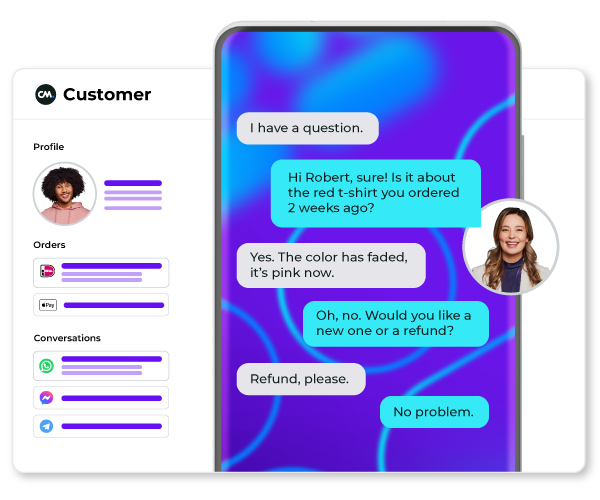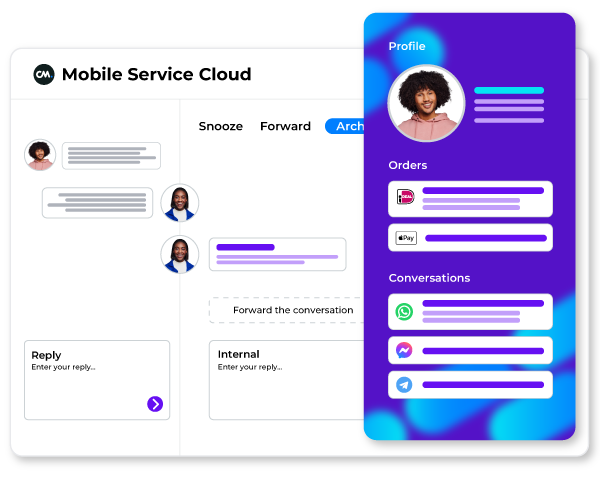- Soft Skills Can Be Hard to Apply
- Ten Crucial People Skills For Customer Service
- 1. Listening
- 2. Clear Language
- 3. Subject Matter Confidence
- 4. Diplomacy
- 5. Timing
- 6. Friendliness
- 7. Empathy
- 8. Positive Attitude
- 9. Generosity
- 10. Team Collaboration
- Keys To Service Success
Technical skills alone are not enough.
A customer is on the phone with a customer service agent, frustrated about a clothing item that was supposed to arrive but hasn’t yet.
The agent refers to Mobile Service Cloud and sees it’s not the first time this customer has called disappointed. But it's also not the first product purchased from the company.
Keeping this person as a repeat customer could depend on how well the agent handles this call - under pressure, with an irritated voice on the end of the other line.
This is not just a matter of being polite. A Service Strategies survey concluded that 96% of respondents felt communication and interpersonal skills are more important than technical skills for successful customer support.
Dealing with customers on the phone, through email, or via live chat requires a variety of people skills. A good customer service representative needs the delicacy of a diplomat, the verbal agility of a politician, the empathy of a therapist, and the good nature of a casual but helpful friend.
All while the customer/prospect on the other end might be screaming and shouting. Maybe even using profanity. Are you and your team ready to handle such moments?

Soft Skills Can Be Hard to Apply
The communication abilities needed to handle the above situation are often called 'soft skills', but they can be hard to apply when a repeat customer is upset.
This is why three of the four Customer KPIs we defined involve these people skills: Speed, Friendliness, and Effectiveness. Refining social skills will directly impact scores in this KPI model.
In many ways, you can compare soft skills to learning to sail.
With a well-made and responsive craft, most people can easily learn the ropes for sailing across calm waters on a sunny day. Yet, you can’t control the weather any more than you can control the people who contact your customer service. Even the best boat is only wood and fabric if the sailor doesn’t know how to adapt to changing weather and rough seas.
Like sailing, customer service requires a skill set that becomes instinctive, especially when the conditions demand immediate feedback. Similarly, customer service agents must tack and jibe their course through the changing winds of customers’ moods and requests. Eventually, with practice, their navigational skills can become as natural as those of a weathered sailor.
Key skills for customer service representatives require communication, emotional intelligence, and teamwork, but can be boiled down to these 10 focus areas.
Ten Crucial People Skills For Customer Service
1. Listening
Nothing frustrates more than having to repeat a question. Understanding what a customer is struggling with instantly is therefore essential.
A handy trick is to summarize the problem or question in your own words. Based on this interaction, you can also gather additional information. This way you can help the customer even better.
2. Clear Language
Unfortunately, too many companies are still relying on jargon. Terms and abbreviations that are self-evident within your company, may not be familiar to customers.
If you use jargon, it becomes more difficult to explain the issue properly and to help the customer. It is therefore important to use language and terminology that the customer also understands. Determine whether your explanation is clear to everyone. For example, consider whether your mother would understand it.
3. Subject Matter Confidence
It should go without saying, but just to be clear: customer service agents need to be aware of the ins and outs of the business. They need to know how the products or services work but also understand prices, terms and conditions, and temporary promotions.
Companies need to find jargon-free, unambiguous terminology for their products and services, and customer service agents should use those terms consistently. That way, it is immediately clear what the question is about, regardless of whether the customer is coming from the website, from a physical location, or elsewhere.
Trust requires in-depth knowledge. It also means pointing it out if a topic is beyond your knowledge. Then make sure the customer or prospect gets information from a specialist. (See also point 10, "Teamwork").

In other words, subject matter confidence means answering the question clearly or else calling in someone who can.
4. Diplomacy
Diplomacy, Winston Churchill allegedly once advised, is the art of telling someone to go to hell in such a nice way that they ask for directions.
Of course, customer service agents are not in the business of telling people to go to hell, nicely or not. But they are in the business of maintaining control of their cool, their dignity, and their word choice regardless of the circumstances.
Conflict resolution? Discover 7 essential skills.
5. Timing
Customer service interactions are marketing opportunities, and well-trained employees know exactly how to exploit those. But just as a comedian's joke can go totally awry if the timing is wrong, the same is true for up-selling.
It's hard to pinpoint the exact moment when the customer service representative can push the conversation in a certain direction. Actually, it's similar to ballroom dancing. Listen to the rhythm and move smoothly with your partner; only then will you instinctively know when to make that turn.
As a manager, do you know which team members are best suited for this aspect of customer service?
6. Friendliness
The old trick to convey friendliness still works: talk or write with a smile on your face. Even though they can’t see you, your tone will remain warm and approachable.
Unless already angry, most people respond favorably to a friendly attitude. This facilitates solving the issue and boosts the chances the customer goes away with a positive feeling about the interaction and your brand.
Still, there is a fine line between being friendly and getting too chummy (e.g., asking too many times if you’ve solved their problem). Satisfaction can easily turn into annoyance when the customer is kept in the conversation longer than necessary. Agents should not be like the back-slapping salesman who won’t let you walk out the door.
7. Empathy
Customer Service Reps are public-facing employees in the profession of helping others.
Customers often want to complain about a problem that is only partially based on their purchase, gush about a newfound love for a product, or share their feelings of mastery or inadequacy.
The trick is to find a way to demonstrate an understanding of the person’s underlying emotional need without going overboard. It’s appreciating customers’ successes without virtually high-fiving them, or demonstrating concern about problems without getting in too deep.
In other words, it’s the equivalent of sitting next to someone on a bench at the bus stop. You listen sympathetically to the person’s story and take action as needed. And then, when the bus arrives, you go your separate ways with a warm and polite goodbye.
8. Positive Attitude
While it’s always more pleasant to deal with someone who sees the glass as half-full, sometimes a customer only sees it as half-empty.
In that case, keep in mind that any glass can be filled completely. All you have to do is turn on the tap.
Remember: customers want their issues resolved in a single interaction. When customers see the glass as half-empty, reassure them that you are sticking with it and that you will solve the problem.

9. Generosity
To continue the metaphor, generosity means filling the glass a little more than you’re obligated to, just to make sure the customer remains happy.
Once the current customer concern is resolved, it’s time to anticipate their next potential issue. For example, if a customer has a question about returning a product, forward resolution means not only answering the question but pre-empting future contact by telling him or her how long it takes to receive their money back.
Obviously, this requires that the brand sets parameters so agents know how to apply forward resolution. But nothing sets the scene for repeat business more than the feeling that the customer service representative has gone the extra mile for you.
10. Team Collaboration
A good customer service representative knows when to pass a case on to someone who may be better able to help the customer. (See "Subject Matter Confidence", point 3)
Sometimes this handover happens in real-time. Other times, a specialist needs to call the customer or prospect back later. Either way, by enlisting additional help, the customer service representative shows that he or she will solve the problem.
At the same time, team collaboration means knowing when it's your responsibility to answer questions and recognize mistakes, then sharing them and coaching each other. Make sure mistakes don't repeat themselves.

Keys To Service Success
Ultimately it is important to treat the person on the other end of the conversation with attention, concern, and respect, and do so with sound technical knowledge. By cultivating these 10 people skills, your agents will be in for smooth sailing no matter the type of customer/prospect inquiry.
